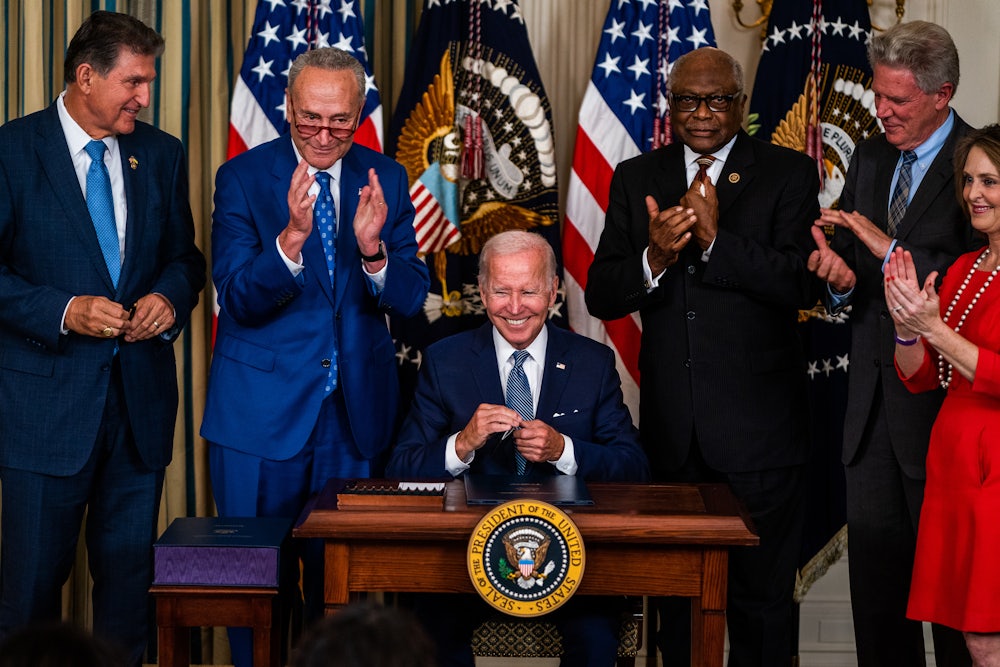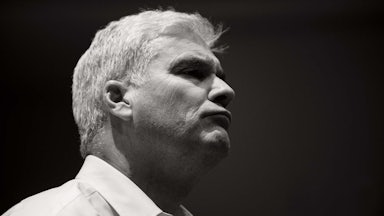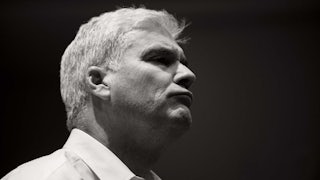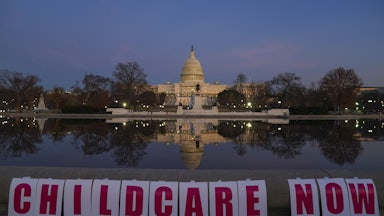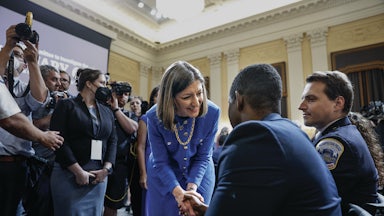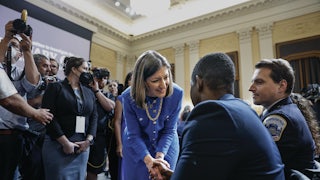When Joe Biden got his start in politics in the early 1970s, many voters still had vivid memories of Franklin Roosevelt. At Democratic Party gatherings, FDR’s theme song, “Happy Days Are Here Again,” remained a treasured part of the playlist. And few epithets in politics were more powerful than likening a Republican to Herbert Hoover.
When Biden ran for president in 2020, in the midst of a pandemic and Trumpian tumult, it was probably inevitable he would take Roosevelt as his role model. Accepting the Democratic nomination in August 2020, Biden invoked FDR and the New Deal but never mentioned John Kennedy, the other touchstone of his political youth. In the closing days of the campaign, Biden flew to Warm Springs, Georgia, where the polio-afflicted Roosevelt had reveled in the soothing waters, to offer homage to that president. As Biden said, “Warm Springs is a good place to talk about hope and healing.”
Biden brought his fixation on Roosevelt into the White House. In a February 2021 CNN interview with Anderson Cooper, Biden said, “I keep reading from presidential historians how I’ve inherited the worst situation since Lincoln, worse than Roosevelt.” Signing his $1.9 trillion stimulus package into law, Biden quoted FDR’s promise of honesty: “I’ll give it to you straight from the shoulder.” Summing up the political mood during the heady early days of the Biden presidency, Susan Glasser wrote in The New Yorker, “Not even a hundred days into his tenure, Biden is being hailed as an aspiring modern-day F.D.R. or L.B.J. who will lead the country out of crisis.”
In hindsight, the deliberate FDR comparisons were a well-intentioned blunder. By raising expectations to Mount Rushmore–like levels, Biden all but guaranteed Democratic disappointment. Forgotten amid the gush was that the Roosevelt’s landslide election to his first term gave the Democrats a nearly 3-to-1 edge in the House and a healthy majority in the Senate—at a time when the filibuster was rarely deployed. Lyndon Johnson was similarly blessed with lopsided Democratic congressional majorities after the 1964 Barry Goldwater wipeout. In sharp contrast, Biden’s agenda was left at the mercy of Joe Manchin in the Senate and Nancy Pelosi’s skills at vote counting in a narrowly divided House.
When Biden was riding high in the 2021, he won 93 percent approval among Democrats in an early August Quinnipiac poll. Then came the cataclysmic withdrawal from Afghanistan, the resurgence of Covid, and the realization that the vaccines might prevent serious illness but not create herd immunity, along with the endless, seemingly futile, negotiations with Manchin and Kyrsten Sinema over Biden’s $3.5 trillion Build Back Better plan. Suddenly, instead of being hailed as a transformational president on par with FDR and LBJ, Biden was ridiculed as an over-the-hill version of Jimmy Carter.
That sneering judgment was, of course, premature.
This has been a summer of Democratic legislative mastery as Biden, Pelosi, and Chuck Schumer have pulled bill after bill out of a magician’s hat. By twenty-first-century standards, the list is impressive: the first gun-safety legislation in nearly three decades; the $280 billion CHIPS Act designed to spur domestic semiconductor production; and, of course, the $740 billion Inflation Reduction Act, or IRA, which is really a landmark climate bill augmented by popular health care provisions, such as allowing Medicare to negotiate down prescription drug prices.
But even now, a sizable chunk of Democratic voters remain fixated on the missing aspects of Biden’s dream-castle legislative agenda. With Mitch McConnell wielding the filibuster like the Grim Reaper, there is no hope of passing voting rights legislation, banning assault weapons, or limiting the damage from the right-wing social conservative majority on the Supreme Court. The Manchin-Sinema meat ax chopped all of the major non-climate policy ideas Democrats had loudly promised voters last year, such programs as free community college, childcare subsidies, a tax credit for children, and home health care programs for the elderly, from the IRA.
The results of these unrealistically elevated expectations can be seen in the polls. Even with a slight rebound in Biden’s numbers, there remains a Democratic deficit. According to a new Ipsos survey, only 75 percent of Democrats approve of Biden’s record as president. The Economist/YouGov poll released last week has Biden’s backing among Democrats bumping up to 80 percent, which is the president’s highest rating since May. At this point in 2010, Barack Obama’s approval rate among Democrats was also at 80 percent in the Gallup poll. And ominously for the Democrats, that mark was seen as part of a continued downswing that ultimately led in November to the Republicans gaining six Senate seats and 63 House seats in a sweep that left Obama mostly governing by executive order during his final six years in office.
The combination of the overturning of Roe v. Wade and the threat to democracy posed by Donald Trump may still galvanize Democratic turnout. But a sense of realism among Democrats about what can be accomplished with a narrowly divided Congress remains an important factor in the upcoming elections. If Biden is still faulted by left-wingers for the failure of unicorns to graze on the White House lawn, then the Democrats are probably doomed in November.
But after this summer’s dramatic legislative turnabout, the White House is in full braggadocio mode. Ron Klain, Biden’s chief of staff, boasted in an interview with Politico last week, “The president has delivered the largest economic recovery plan since Roosevelt, the largest infrastructure plan since Eisenhower, the most judges confirmed since Kennedy, the second largest health care bill since Johnson and the largest climate change bill in history.” There is merit to Klain’s argument, though it does make Obama and Bill Clinton look like pikers.
The political measure of a president extends well beyond the legislative scorecard. Unlike Clinton and Obama, Biden lacks natural charisma. Unlike Kennedy, Biden has not demonstrated the ability to inspire. Unlike Roosevelt, in particular, Biden does not display jaunty optimism or possess the magic gift to forge an emotional connection through the sound of his voice.
Biden, instead, is more like Harry Truman—a longtime senator who ascended to power at a time of national crisis. At his best, Biden offers calm competence. Which is why Klain and other top White House officials should stop overhyping Biden as a modern-day Franklin Roosevelt. Instead, they should honestly portray Biden as a good man—like Truman, and unlike Trump—doing his best in terrible times.
